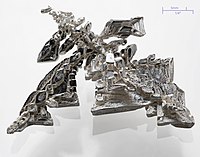
Photo from wikipedia
Magnesium and its alloys are promising material candidates for degradable fracture fixation devices due to their suitable mechanical properties and biocompatibility; however, their fast corrosion in aqueous media causes pain and… Click to show full abstract
Magnesium and its alloys are promising material candidates for degradable fracture fixation devices due to their suitable mechanical properties and biocompatibility; however, their fast corrosion in aqueous media causes pain and swelling. In this study, a hybrid coating system composed by a sol–gel silica-based matrix with bioactive glass microparticles and silica–gentamicin nanoparticles was deposited by spray technology on magnesium AZ91D alloy. The coating was homogeneously distributed on the surface and protected the degradation of AZ91D alloy in simulated body fluid for at least 28 days, preventing the pH increase of the solution and accelerating the formation of calcium phosphate-related compounds on the surface. Moreover, inhibition of bacteria growth was proved for Staphylococcus aureus and Escherichia coli and increased cell adhesion and proliferation of ST-2 and differentiated MC3T3-E1 cells was shown. The generated coating is a promising surface treatment for providing bioactive and antibacterial proprieties to new degradable implants.
Journal Title: Journal of Materials Research
Year Published: 2021
Link to full text (if available)
Share on Social Media: Sign Up to like & get
recommendations!